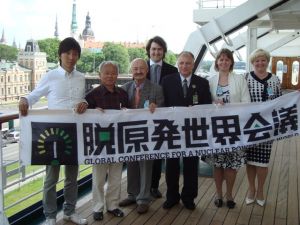Difference between revisions of "Peace Boat brings message from Fukushima to Riga: Nuclear Free Now!"
(updated) |
(+cat) |
||
| Line 41: | Line 41: | ||
[[Category: Accidents]] | [[Category: Accidents]] | ||
[[Category: Latvia]] | [[Category: Latvia]] | ||
| + | [[Category: English]] | ||
</noinclude> | </noinclude> | ||
Latest revision as of 17:48, 6 June 2015
On Wednesday May 22, 2013, the Japanese based Peace Boat visited the port of Riga, Latvia with close to 800 participants onboard, including people from Fukushima. Peace Boat hereby invites interested media, NGOs and members of the public to join us on this occasion for a press conference and discussion onboard the ship.
Report of the event
On May 22 the Peace Boat had a stop in Riga, Latvia, which consisted of a press conference and a discussion onboard. Peace Boat (est.1983) is a Japan-based international non-governmental and non-profit organization that works to promote peace, human rights, equal and sustainable development and respect for the environment. Peace Boat carries out its main activities through the organization of educational peace voyages onboard a large passenger ship.
This is their 79th Global Peace Voyage and I would like to say big “THANK YOU!” to Alda Ozola from Latvian Green Movement who made the stop in Riga possible!
Peace Boat came to Latvia to tell about the true scale and impacts of the Fukushima disaster. The first speaker in the press conference was Mr Katsutaka Idogawa, former Mayor of Futaba, the town closest to the destroyed Fukushima Daiichi Nuclear Power Plant (NPP). After the first explosion when radiometers on his office window registered radiation levels that were off the charts he made a decision to relocate his town’s whole population under his authority as there was no information – neither from the power plant, nor the government – on how to proceed. He was the only mayor in Fukushima Prefecture to do so.
In past Mr Idogawa was an active supporter of the government’s nuclear policy but after the Fukushima disaster his beliefs changed. Now he stands up for a nuclear free world and criticizes the government for hiding information regarding the Fukushima disaster. Because of his political activity Mr Idogawa was forced to step down from his position.
The second speaker was Mr Kenta Sato from Iitate, a village about 39 kilometers northwest of Fukushima Daiichi NPP. Before the Fukushima Disaster it had approximately 6200 inhabitants. Its main industries were agriculture, farming and floriculture. Now the village is evacuated and inhabitants are placed in temporary accommodation where they suffer from different psychological problems and are unsure about their future.
Recently Mr Sato together with Mr Idogawa visited Pyhäjoki in Finland where Fennovoima plants to build an NPP. They both stated that they could not believe that this beautiful place will be destroyed.
After the press conference representatives from Latvian Union „Chernobyl” and Occupational and Radiation Medicine Center of Pauls Stradins Clinical University Hospital joined for a discussion. „Chernobyl” is a nongovernmental organization, which is represented by clean-up workers that have been working in Chernobyl after the accident as well as in other objects of nuclear exposure. Their health is monitored by Occupational and Radiation Medicine Center.
Mr Idogawa, Mr Sato and representatives of „Chernobyl” discussed the disasters in Chernobyl and Fukushima and similarities and differences between them. For instance, the availability of information about the scale of the accidents. The Soviet government was hiding information about radioactive pollution. The Japanese government made the annual dose limit 20 times higher after the Fukushima accident - from 1 mSv/year to 20 mSv/year. Now the Japanese government is planning to clean the soil and bring people back in order to stop paying compensations. Mr Idogawa and Mr Sato said that this is a significant difference between the Soviet and the Japanese governments – the Soviet government really took people away, while the Japanese government is willing to bring them back. After the discussion group photos were made and exchange of business cards took place. The whole event lasted for nearly five hours.
What is Peace Boat?
Peace Boat is a Japan-based international non-governmental and non-profit organization that works to promote peace, disarmament, human rights, equal and sustainable development and respect for the environment. Peace Boat has carried out emergency relief operations following the triple disaster which hit Japan on March 11, coordinating over 18,000 volunteers in the disaster-affected areas. Peace Boat has been working closely with other citizens and experts groups to support citizens both remaining in Fukushima and those who have evacuated to other parts of Japan, and plays a leading role in the ever growing movement for Japan to learn from the lessons of the Fukushima nuclear disaster and move away from nuclear power to more sustainable forms of energy. Peace Boat is continuing to raise awareness of the ongoing situation in Fukushima, where the nuclear plant remains extremely unstable and approximately 160,000 people continue to live in evacuation both within and outside of Fukushima Prefecture, forced to live as internally displaced persons, with even their basic human rights neglected.
Voices from Fukushima
As part of this mission, Idogawa Katsutaka, former mayor of Futaba Town, will be joining Peace Boat as it travels though Europe. Futaba town was just three kilometres away from the Fukushima Daiinichi Nuclear Power Plant. When the earthquake and tsunami hit the east coast of Japan and caused a series of meltdowns and explosions at the nuclear reactors in March 2011, many local communities had to be evacuated due to high radioactivity. Mayor Idogawa was the only mayor in Fukushima Prefecture who decided to officially relocate his town's whole population and its administrative functions to outside the prefecture under his authority. The residents are still not able to return, and will not be able to for decades, if ever. Former Mayor Idogawa will share his experiences of the Fukushima nuclear disaster and its serious ongoing affects, and appeal about the continuing dangerous situation regarding radiation and health.
Program
Join us for a Press Conference and discussion onboard Peace Boat as it is docked at the port of Riga, Latvia on the afternoon of May 22, 2013. Details will be announced shortly, however due to port security requirements, prior registration is strictly required. We apologise for the inconvenience, however if you are considering attending please send the following information by email to Meri Joyce by May 18, 2013 (Saturday):
Full name Nationality Date of birth Gender ID type and number (eg drivers license, national ID, passport – anything official with a photograph) Contact email and telephone number
Times and other details are subject to change – please refer to information provided by Peace Boat in advance.
Speakers
- Mr Idogawa Katsutaka, former mayor of Futaba, Fukushima
- Representative of Peace Boat
- Mr Andrey Ozharovskiy, nuclear expert with Bellona
Contact
For any enquiries or further information, please contact:
- Meri Joyce, Peace Boat International Coordinator, meri AT peaceboat.gr.jp[1]
- ↑ For protection against automatical email address robots searching for addresses to send spam to them this email address has been made unreadable for them. To get a correct mail address you have to displace "AT" by the @-symbol.








